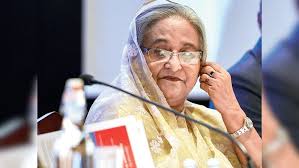
Table of Contents
Sheikh Hasina: The Unwavering Leadership of Bangladesh’s Prime Minister
Sheikh Hasina, the Prime Minister of Bangladesh, is a towering figure in the nation’s political landscape. Her tenure has spanned several decades, marked by transformative changes in Bangladesh’s development, economy, and international standing. This article delves into Sheikh Hasina’s life, her political journey, the impact of her leadership, and the challenges she has faced.
Early Life and Political Beginnings
Sheikh Hasina was born on September 28, 1947, in Tungipara, a small village in what was then British India and is now Bangladesh. She is the eldest daughter of Sheikh Mujibur Rahman, the founding father of Bangladesh and a central figure in the country’s struggle for independence. Her early years were shaped by the political turbulence that characterized the struggle for Bangladesh’s autonomy and independence.
Educated in Dhaka and later in the United States, Sheikh Hasina pursued a degree in Bengali literature from the University of Dhaka. Her academic background and her close association with her father’s political work laid the foundation for her future in politics. After her father’s assassination in 1975, she spent years in exile in Europe, returning to Bangladesh in the early 1980s to lead the Awami League, the party founded by her father.
Political Ascendancy and Leadership
Sheikh Hasina’s rise to power was marked by a combination of political acumen and perseverance. In 1996, she became the Prime Minister of Bangladesh for the first time, leading the country through a period of significant political and economic reform. Her initial tenure was characterized by efforts to stabilize the nation, implement economic policies, and enhance social welfare programs.
Her leadership was interrupted by political turmoil and opposition, but she returned to power in 2009, following a landslide victory in the general elections. Since then, Sheikh Hasina has led the country through three consecutive terms as Prime Minister, making her one of the longest-serving leaders in Bangladesh’s history.
Economic and Social Reforms
Under Sheikh Hasina’s leadership, Bangladesh has experienced notable economic growth and development. Her government has prioritized infrastructure development, including the construction of roads, bridges, and ports, which has been crucial for boosting trade and connectivity. The completion of the Padma Bridge, a landmark infrastructure project, stands as a testament to her administration’s commitment to national progress.
In addition to infrastructure, Sheikh Hasina’s government has focused on improving the education and health sectors. Her administration has implemented policies to increase literacy rates, expand access to healthcare, and promote gender equality. The introduction of various social safety nets and poverty alleviation programs has played a significant role in improving the quality of life for many Bangladeshis.
Challenges and Controversies
Despite the positive strides, Sheikh Hasina’s tenure has not been without controversy. Her administration has faced criticism for alleged human rights abuses, suppression of dissent, and restrictions on press freedom. Accusations of authoritarianism and political repression have been a recurring theme, with opposition parties and human rights organizations often raising concerns about the state of democracy in Bangladesh.
The political environment in Bangladesh has been highly polarized, with allegations of electoral fraud and violence during elections. Critics argue that the consolidation of power within the ruling party has undermined democratic institutions and eroded political freedoms.
Foreign Policy and International Relations
On the international stage, Sheikh Hasina has worked to strengthen Bangladesh’s relationships with global powers and regional neighbors. Her foreign policy has emphasized economic diplomacy, trade, and investment. She has sought to position Bangladesh as a key player in regional and global forums, advocating for issues such as climate change and sustainable development.
One of her notable achievements in foreign policy is the management of the Rohingya refugee crisis. Bangladesh has hosted hundreds of thousands of Rohingya refugees fleeing persecution in Myanmar, a humanitarian effort that has drawn international attention and praise. Sheikh Hasina’s handling of the crisis has demonstrated her commitment to humanitarian principles and regional stability.
Legacy and Impact
Sheikh Hasina’s impact on Bangladesh is profound and multifaceted. Her leadership has been instrumental in shaping the country’s economic landscape, advancing social development, and navigating complex international relations. Her tenure has also been marked by significant progress in areas such as gender equality and infrastructure development.
However, her leadership has been polarizing, with critics pointing to issues related to governance, human rights, and democratic practices. The balance between her achievements and controversies defines her legacy, reflecting the complexities of leading a nation through periods of rapid change and development.
Conclusion: A Complex Legacy
Sheikh Hasina’s tenure as Prime Minister of Bangladesh is a testament to her resilience, political skill, and commitment to national progress. Her leadership has brought about significant advancements in the country’s development, economy, and international standing. At the same time, her administration has faced challenges and criticisms that reflect the broader struggles of governance in a rapidly changing political environment.
As Bangladesh continues to evolve, Sheikh Hasina’s legacy will be evaluated through the lens of both her accomplishments and the controversies that have marked her time in office. Her story is a compelling example of the complexities and challenges faced by leaders in the contemporary global landscape.
Official Website of the Prime Minister’s Office of Bangladesh
https://www.pmo.gov.bd/
The official site offering information on the Prime Minister’s activities, policies, and announcements.
